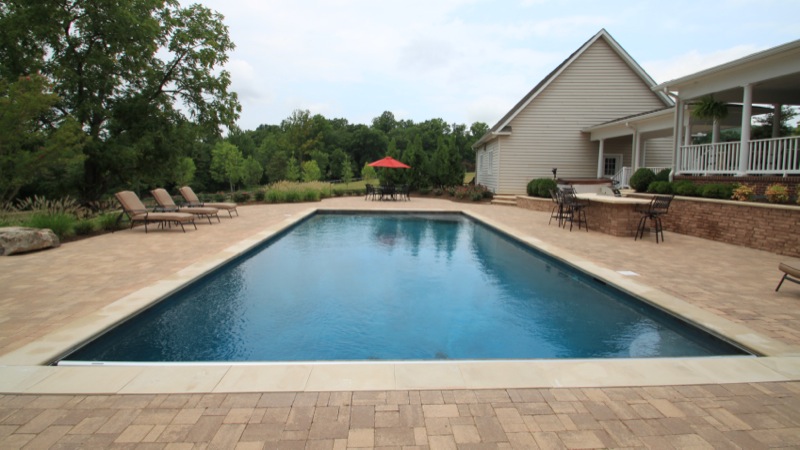What Homeowners Need to Know
A backyard pool is a dream for many homeowners, but before you take the plunge, it’s essential to understand the cost of owning a pool. While a pool provides relaxation, entertainment, and added property appeal, the financial commitment goes well beyond installation. Ongoing maintenance, repairs, utilities, and even insurance can add up quickly.
A pool can be one of the largest investments a homeowner makes—second only to the house itself. To make an informed decision, it’s important to break down both the upfront and long-term expenses of pool ownership.
Upfront Costs: Building a Pool
The initial cost of installing a pool varies based on size, materials, and features. A basic in-ground pool typically starts around $40,000 for a liner pool in rural areas, but luxury designs with waterfalls, custom lighting, and heating systems can easily exceed $100,000 – $200,000 in the metro DC area.
Location also plays a role. Sabine H. Schoenberg, a home improvement expert, emphasizes the importance of placement when installing a pool. “If it’s in one faraway corner, people aren’t going to use the pool,” she notes. Proper positioning ensures the pool is both functional and inviting.
Beyond construction, homeowners must consider fencing, decking, and landscaping, all of which add to the total cost. Many municipalities require safety barriers, which can range from $2,000 to $10,000, depending on materials and design.
The Cost of Pool Maintenance
Once installed, a pool requires regular upkeep to keep it clean, safe, and running efficiently. The cost of owning a pool includes routine maintenance, chemicals, and seasonal services. According to Citizens Bank, the average cost of opening and closing the pool, keeping the pool skimmed and vacuumed, and routine water testing and chemical balancing, and more can be thousands per year.
Saltwater pools tend to have lower chemical costs, but they require specialized maintenance and equipment replacement that can offset savings.
Additionally, electricity costs can surprise many new pool owners. Running the pump, heater, and lights can add $3,000 to $5,000 per year to your utility bills. Investing in energy-efficient systems, such as variable-speed pumps and automated timers, can help reduce long-term expenses.
Unexpected Repairs and Replacement Costs
Like any major home feature, pools require occasional repairs. Equipment such as pumps, filters, and heaters wear out over time, and unexpected breakdowns can lead to costly fixes. On average, homeowners should budget $3,000 to $5,000 per year for repairs and utilities.
Structural repairs can be even more expensive. Resurfacing a gunite or concrete pool can cost anywhere from $5,000 to $10,000 or more, depending on the finish. Vinyl liner replacements typically range from $3,000 to $5,000, while tile repairs or coping replacement can run even higher.
Leak detection and repairs can also be a significant expense. Small leaks can lead to larger structural issues if left unchecked, making regular inspections a smart investment.
Insurance & Liability and the Cost of Owning a Pool
Owning a pool impacts your home insurance policy. Most homeowners need to increase their liability coverage in case of accidents, and some insurance providers require additional umbrella policies. Premiums may rise by $50 to $100 per month, depending on coverage levels and safety features.
Safety is a major concern for insurers. Installing a self-latching fence, pool alarm, and proper lighting can help keep premiums lower while ensuring your pool is secure.
Is a Pool Worth the Investment?
Despite the costs, many homeowners feel that having a private pool is worth every penny. A well-maintained pool enhances property appeal, provides a convenient escape from the summer heat, and offers endless entertainment and relaxation.
However, it’s important to recognize that not all homebuyers view pools as an asset. As U.S. News Money points out, “Just as there are people with positive feelings towards pools, there are those with negative feelings.” Pools require upkeep, and some buyers see them as a liability rather than a luxury.
The key to maximizing your investment is proper planning and budgeting. Regular maintenance, energy-efficient systems, and smart safety measures help control costs while ensuring long-term enjoyment.
Ready to Make a Splash?
If you’re considering building a pool or need expert maintenance for your existing one, Great Falls Pools is here to help. Our team specializes in custom pool design, expert repairs, and professional upkeep to keep your pool looking and performing its best.
Contact us today to learn more about our services and get a quote!



